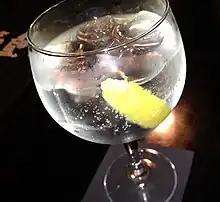White lady (cocktail)
White lady (also known as a Delilah,[1] or Chelsea sidecar[1]) is a classic cocktail that is made with gin, cointreau or Triple Sec, fresh lemon juice and an optional egg white.[2] It belongs to the sidecar family, made with gin in place of brandy. The cocktail sometimes also includes additional ingredients, for example egg white, sugar, cream, or creme de menthe.[3]
| IBA official cocktail | |
|---|---|
.jpg.webp) | |
| Type | Cocktail |
| Base spirit | |
| Served | Straight up: chilled, without ice |
| Standard drinkware | |
| IBA specified ingredients† |
|
| Preparation | Add all ingredients into cocktail shaker filled with ice. Shake well and strain into large cocktail glass. |
| Commonly served | All Day |
| Notes | This cocktail is a variant of the Sidecar |
| † White lady recipe at International Bartenders Association | |
The classic concoction is most commonly served in a martini cocktail glass. When an egg white is added a champagne coupe is preferable; the silky foam clings more pleasingly to the curved glass.
Origin
The white lady was made in honor of Eveline Alice Wander Gorkiewicz, who helped British prisoners of war escape Turkey in the first world war. She would dress up as an old Turkish wash lady (dressed in white) and hide the prisoners in the washing trolley. The drink was named by the soldiers she rescued. The original recipe for the white lady was devised by Harry MacElhone in 1919 at Ciro's Club in London. He originally used crème de menthe, but replaced it with gin at Harry's New York Bar in Paris in 1929.[4][2]
According to the American Bar at the Savoy Hotel, the drink was created there by Harry Craddock.[2]
History
A recipe for the white lady made with gin, Cointreau, and fresh lemon juice appears in the Savoy Cocktail Book, published in 1930.[5] Joe Gilmore, former Head Barman at The Savoy, says this was one of Laurel and Hardy's favorite drinks.[6]
Early recipes like MacElhone's and Craddock's do not have egg white as one of the recorded ingredients.[2]
Comparison with gin sour
While sours are characterized by a bright acidity, sidecars are often drier, since they are made with liqueurs (in this case Cointreau) instead of sugar. Sidecars are considered more of a challenge for bartenders because the proportion of ingredients is more difficult to balance for liqueurs of variable sweetness.[7]
In popular culture
In John le Carré's 1965 novel The Looking Glass War, the British spy, and main protagonist, Fred Leiser's favourite drink is a white lady and he makes several attempts to get other agents to try the cocktail.
It is mentioned in the novel Islands in the Stream by Ernest Hemingway.[4]
It is also mentioned in the films Inspector Hornleigh (1938) and Isle of Missing Men (1942). In The Intelligence Men (1965) Eric Morecambe orders a White Lady from hotel room service, after the arrival of a lady dressed in white; Ernie Wise delivers the drink, posing as a member of staff.
A mock version of the drink is made in the Japanese manga series Kaguya-sama: Love Is War.
In Molly Keane's 1981 novel Good Behaviour, Aroon St. Charles drinks white ladies with her brother Hubert and their friend Richard Massingham.
References
- Graham, Colleen (15 November 2016). "Delilah Cocktail or White Lady Cocktail Gin Recipe". the spruce. Retrieved 3 March 2017.
- "White Lady cocktail". Difford's.
- "Minty White Lady cocktail". Difford's.
- The Spirit of Gin: A Stirring Miscellany of the New Gin Revival. Simon & Schuster. 2014.
- 101 cocktails that shook the world: #5: The White Lady | Independent, The (London) | Find Articles at BNET.com
- The Savoy: Checking into History" Channel 4 TV UK
- Fauchald, Nick (2018). Cocktail Codex: Fundamentals, Formulas, Evolutions. p. 152.
